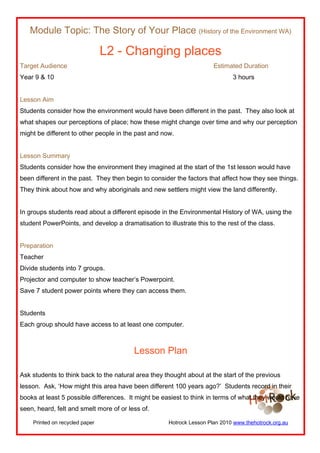
Changing Places: A History of WA's Environment
- 1. Module Topic: The Story of Your Place (History of the Environment WA) L2 - Changing places Target Audience Estimated Duration Year 9 & 10 3 hours Lesson Aim Students consider how the environment would have been different in the past. They also look at what shapes our perceptions of place; how these might change over time and why our perception might be different to other people in the past and now. Lesson Summary Students consider how the environment they imagined at the start of the 1st lesson would have been different in the past. They then begin to consider the factors that affect how they see things. They think about how and why aboriginals and new settlers might view the land differently. In groups students read about a different episode in the Environmental History of WA, using the student PowerPoints, and develop a dramatisation to illustrate this to the rest of the class. Preparation Teacher Divide students into 7 groups. Projector and computer to show teacher’s Powerpoint. Save 7 student power points where they can access them. Students Each group should have access to at least one computer. Lesson Plan Ask students to think back to the natural area they thought about at the start of the previous lesson. Ask, ‘How might this area have been different 100 years ago?’ Students record in their books at least 5 possible differences. It might be easiest to think in terms of what they would have seen, heard, felt and smelt more of or less of. Printed on recycled paper Hotrock Lesson Plan 2010 www.thehotrock.org.au
- 2. Introduce the idea of a changing baseline. What we think of as a pristine natural environment may in fact be quite different to one that was around in the past. For example the number of native animals and birds is likely to be much lower now due to predation by invasive species e.g. foxes as well as the destruction of surrounding habitat. Ask pupils to think about what it is that changes the landscape. The answer is humans. Discuss with them how different attitudes to the landscape and the environment will cause them to change it in different ways. They could think about the different attitudes between aboriginals and settlers 200 years ago. Students should divide their page into 2, aboriginals on one side, settlers on the other and write down some of the ways that they think these people would view the land and the things that would shape these views. E.g. Aboriginal Settler • Familiar. • Have lived in landscape for generations. • History of hunting. • Know uses of native plants and animals move to take advantage of the seasons and different things available in different places at different times. • Strange, different to what they know don’t value native species, want to introduce things from home, to make themselves feel at home. • Need to make money and live. • Looking for where can grow crops and build homes want to clear land for these. Discuss their answers and encourage students to think about how their own history/culture will affect how they see the landscape (have they always lived in the city? Do any of their hobbies/ interests involved outside spaces). Encourage empathy for others and an understanding of why different people might hold different views. Printed on recycled paper Hotrock Lesson Plan 2010 www.thehotrock.org.au
- 3. Divide the class into 7 groups. Explain that each group will get a PPT with information about a different episode in the environmental history of WA. These are the titles of the different PPTs. 1. The First Australians. 2. European Arrival and Invasion. 3. White society in the 19 th Century. 4. Chopping down trees in the 20 th Century. 5. Where have all the animals gone? 6. The story of Perth. 7. Good news at last. The group should study their PPT and decide what the most important and most interesting points are. They should record both of these. Then introduce their task which is to produce a dramatisation to illustrate the main points and themes from their Powerpoint. They should think about the people involved and why they might do things. E.g. In the Story of Perth they could enact early life on a suburban block, explaining why they need to be so big and then a family looking to build a house on a new edge of town development, why do they want to do it, could something make them think about the environmental impact, maybe a meeting with an older person who remembers it how it was before. Each dramatisation should be about 5 minutes long. Give the groups the remainder of the hour, and the next lesson to plan their dramatisations. Go round helping the groups and keeping them on task. In the 3 rd hour (lesson) the groups should present their dramatisations. These should be done in the order on the teachers Powerpoint. After each dramatisation discuss what they were trying to say as a class, what new things they learnt etc. Other groups should be encouraged to put questions to the groups. You might like to use the worksheet for L3 – Future places as a recording sheet for students during the presentations, or the factors on it as ones to think about during presentations. Printed on recycled paper Hotrock Lesson Plan 2010 www.thehotrock.org.au